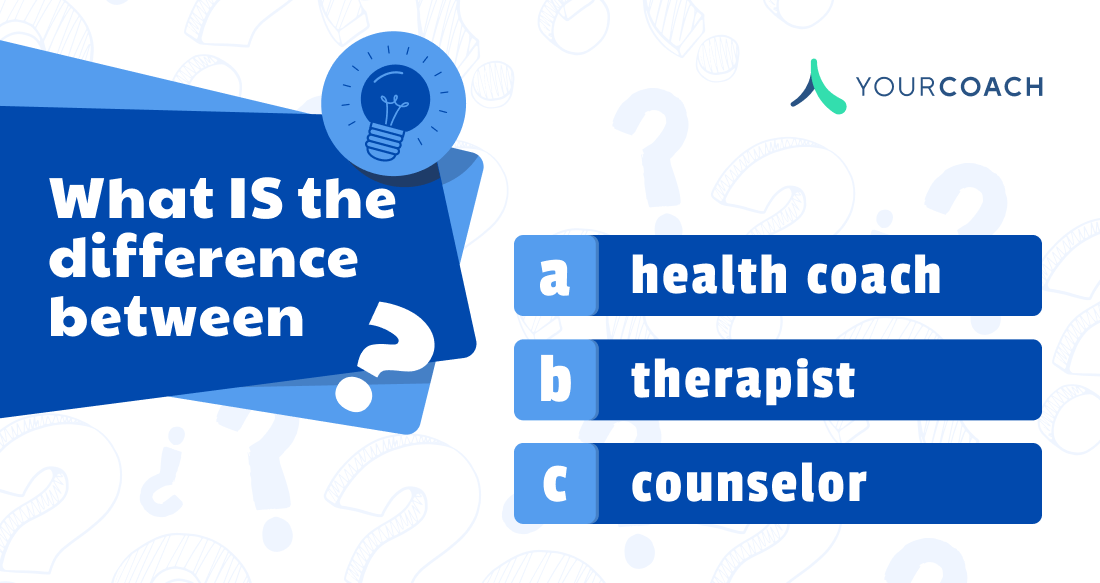
When it comes to supporting overall health and wellbeing, health coaches serve a very necessary, yet distinct, function. The health coaching scope of practice has been carefully defined by key organizations like the National Board for Health and Wellness Coaching (we’ve also worked to outline it within our 2023 Global Health & Wellbeing Coaching Report) in order to establish its unique and important place among other health and care professionals.
As we continue to grow, build and scale health coaching within more organizations, we’ve been frequently asked, “What actually separates a health coach from a therapist and counselor?” In today’s blog, we’re here to share more about the key differences between these three important professions, outline the appropriate expectations you should have before working with either of the three, and make a strong case for why each is equally important, and very often complementary to one another.
What should you expect when working with a health coach vs. a therapist or counselor?
Health coaches are there to support you in defining and achieving health-related goals. This might mean building healthier habits or establishing new ones. When working with a health coach, you should expect personalized, hands-on support and a collaborative relationship that catalyzes better overall health and wellbeing. Success is measured by positive lifestyle changes, enhanced awareness and improved health metrics/biomarkers.
Unlike a health coach, who might be focused on helping you achieve better overall physical, emotional and mental health and wellbeing, therapists are most focused on the latter two. Their goal is to address, manage and diagnose mental health challenges, exploring your emotions and thoughts to understand patterns of behavior. Success is measured by improved mental health and better coping mechanisms.
If envisioning their overlap Venn diagram-style, counselors have a bit in common with both health coaches and therapists. However ,counseling is usually focused on short-term circumstances and transitions, like relationships, career transitions, or grief. Success is generally measured by improvements in a given focus area—for example, enhanced personal relationships or acquiring new coping strategies.
What are some unexpected differences between these three roles?
If we were to boil it down to simplest terms, health coaches focus on, “What does happy and healthy look like for you and how can we get there?” ”Counselors focus on the fairly immediate next—they’re mostly focused on the, “What has led you to this point and what do you need moving forward?” In contrast, therapists are most focused on the “why?” exploring past experiences and trauma that have perpetuated the patterns you might be experiencing. Each is important and may be particularly critical depending on what you’re looking to accomplish. Similarly, our health goals are quite nuanced, which is why it’s often helpful to work with a health coach and therapist in tandem—addressing the root cause of ongoing mental health conditions while targeting the short- and long-term behaviors that might influence mental health profoundly.
In the same vein, each of the three professions approaches their sessions a bit differently. Health coaches take a client-centered approach, working collaboratively with clients to define, set and achieve goals with the shared ideal that clients are the expert in their own lives. Counselors and therapists might vary in their approach. Many take a directive approach, where the therapist or counselor plays a major role in guiding support and treatment. Others might take a non-directive approach, where the client takes the lead, and some might combine the two.
What training and education is required for each?
As is typical with most health and care careers, the education and certifications required for each profession differ quite a bit. A health coach, for example, might have an educational background in a variety of verticals, like nutrition, exercise science or even public health. They often have received specific training, certifications or accreditations, for example, the National Board for Health & Wellness Coaching offers a certifying exam for which we, at YourCoach, offer a three-times-yearly scholarship. Therapists or counselors sometimes hold bachelor’s degrees in related fields like psychology or social work; however, many hold advanced degrees like a master’s or doctorate. Both need to pass a licensure exam in the state where they’re practicing.
How do health coaches work in complement to other health and care professions?
Health coaches often serve as one of the important parts of the patient care team. That’s because they spend regular, dedicated time with clients addressing their needs holistically and enacting change where it really counts—beyond the doctor’s office. They very often are able to identify when the support of an additional health and care professional might be needed and can encourage clients to seek out that additional help, setting up a plan of action when necessary.
Moreover, health coaches work closely with other health and care professionals, like therapists, counselors and physicians, to ensure goals set in their sessions become a part of their routine. For example, therapists might suggest coping strategies that health coaches can embed into a client’s daily routine. They can also work closely with clients and physicians to increase medication adherence, ensuring they regularly take prescribed medications to help control mental or physical health conditions. We’ve seen this firsthand through our partnership with Medisafe and have highlighted the effectiveness of health coaching interventions for medication adherence within our Deep Dives.
If you’re interested in learning more about how we partner with companies to deliver health coaching services to your population, contact us at team@yourcoach.health.


